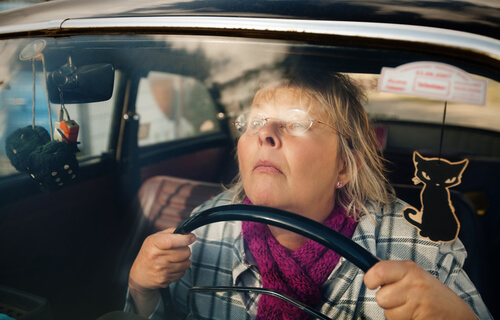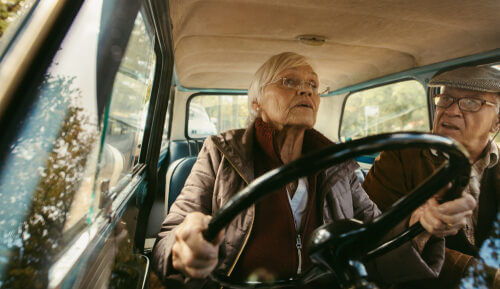
Page contents
- Why can elderly people be less safe to drive?
- Why might an older person hide that they are struggling with driving?
- 5 signs an elderly person may no longer be safe to drive
- How can I be sure if an elderly person is safe to drive or not?
- What should I do if my loved one is unsafe to drive but won’t stop?
Page contents
- Why can elderly people be less safe to drive?
- Why might an older person hide that they are struggling with driving?
- 5 signs an elderly person may no longer be safe to drive
- How can I be sure if an elderly person is safe to drive or not?
- What should I do if my loved one is unsafe to drive but won’t stop?
There is no upper age limit on driving in the UK, but unfortunately it is common for elderly people to lose their ability to drive safely. If this is the case with an older loved one, while you want them to be as independent as possible, they could be putting themselves and others at very serious risk if they continue to drive.
In the UK, all drivers over 70 years old must renew their licence every three years. The first renewal should be done before the person’s 70th birthday.
If your loved one has been diagnosed with dementia, they are legally obliged to declare this to the DVLA (or DVA in Northern Ireland) regardless of their age, because it is a notifiable medical condition that can seriously affect their ability to drive safely. Other notifiable medical conditions include diabetes, heart conditions, glaucoma and conditions that mean you stop breathing or have seizures.
Why can elderly people be less safe to drive?
The natural effects of old age and various conditions that come with age can inhibit a person’s driving abilities. This can result in an elderly person being less safe to drive due to:
- Slower reflexes
- Stiffness
- Slower decision making
- Poor eyesight
- Difficulty judging the speed and distance of other vehicles
- Forgetfulness and confusion
- Lack of confidence
- Overconfidence, “I’ve never crashed before”, “I’ve always been a great driver” attitude
Why might an older person hide that they are struggling with driving?
Reasons someone might downplay, hide or deny their increasing difficulties with driving could include:
- They are embarrassed
- They don’t want to be banned
- They rely on driving as they find walking and public transport more difficult in old age
- They don’t feel safe walking or using public transport due to frailty
- It is a loss of freedom to an extent and they don’t feel willing or ready to lose that freedom
- They aren’t aware that they’re driving dangerously, they might have early signs of dementia and really not realise
- They know they shouldn’t be driving but think it’s okay if they’re only doing short local trips
5 signs an elderly person may no longer be safe to drive
Lots of people make the odd mistake when driving, but if your older loved one is increasingly making mistakes or driving dangerously, they may soon need to stop driving for the safety of themselves and others. Some of the signs below could indicate that your loved one is aware that they are struggling to drive safely and may have had near misses that you don’t know about. Signs could include:
Damage to their car or driveway
- Small scrapes and dents are appearing on their vehicle
- There is damage to the wall or fence by their driveway, or flattened flowerbeds
- One of their lights is smashed
- They are reluctant to talk about how damage happened or hadn’t noticed it
Avoiding driving others or driving at all
- They make excuses not to drive if you will be in the car with them, or seem agitated if they agree to
- They refuse to drive their grandchildren or other vulnerable people anywhere
- They are ducking out of their turn to drive to social commitments with their friends
- They are increasingly using public transport or walking
- They’ve given up an activity they used to drive to because it’s “too far” or another vague reason that you suspect may be because they have lost confidence in their driving abilities
Lacking awareness of other drivers or the rules of the road
- They appear surprised when they have to slow or stop for another car, and might say things like, ”Where did they come from?” often
- They don’t seem to think about right of way
- They pay little heed to speed limits, such as going at 40mph in a 60mph zone then continuing at 40mph when the limit changes to 30mph
- Increasing road rage
- If they are in early stages of dementia, they may try to take routes that no longer exist or get lost on previously familiar journeys. They may start to show antiquated practices when driving, like not wearing a seatbelt or having an alcoholic drink ‘for the road’
Excessively cautious driving
- Driving significantly under the speed limit with a queue of cars behind them
- Taking forever to get out of junctions when there have been plenty of safe opportunities
- Reluctance to park near other cars
They’re getting into trouble
- They have started getting (or more than usual) speeding tickets, parking fines and fines for driving in bus lanes
- They have had to claim on their insurance for damage to someone’s vehicle
- Neighbours have complained
How can I be sure if an elderly person is safe to drive or not?
If you have any doubts over whether your loved one is safe to drive, asking them about it is the right thing to do, even if feel like you are hurting their feelings or potentially taking their freedom away. Addressing the issue could save lives.
The problem could be something as simple as that they need new glasses or that they need to change to an automatic gearbox from a manual one. They might be very aware that they are struggling and open to ideas to find a solution.
Get them an assessment
A driving assessment is a great way to find out if your loved one is safe to drive or not. It may prove that they’ve just been nervous and are perfectly safe to drive, or it may show that your concerns were warranted.
Driving assessments can be a simple, self-referred review for people who are concerned about their abilities, or a more detailed assessment for people with medical conditions or disabilities.
Find out more about driving assessments and where to find one in your area here.
What should I do if my loved one is unsafe to drive but won’t stop?
Talk to them
Make sure your loved one really understands the seriousness of driving dangerously or when they are not fit to, and that there are plenty of options available to them.
If they have had a small collision or a speeding ticket, they may be offered a Speed Awareness course or a Safe and Considerate Driving course. Encourage them to take that option instead of a fine.
Arrange some driving lessons
Your loved one may benefit, both in their abilities and their confidence, by having some driving lessons or refresher driver training.
Explore alternative modes of transport
If they are concerned about losing their independence, you could explore other modes of transport, particularly to places they go regularly, and try them out. This could help them to ease into life as a non-driver and start to enjoy benefits of it, like saving money, faster journeys or being able to read and relax as they travel.
You could support them to look into:
- Discounts for older people using public transport, like a Senior Railcard or a free bus pass (bus passes are free to everyone above state pension age in England and to everyone over 60 in Wales and Scotland. Northern Ireland has 60+ SmartPass and Senior (65+) SmartPass cards).
- Support that’s available locally, such as volunteer driver services or coach trips. You can find information about what’s available in your area through social media, local newspapers and newsletters, or council websites.
- Practise using public transport to go to regular destinations with them. Help them to try a few out and see what they feel comfortable with.
- Alternative modes of transport for very short journeys, like mobility scooters or adult tricycles (electric ones are available).
Notify the DVLA/DVA
If worst comes to worst, you may have to forcibly prevent your loved one from driving if they are continuously putting others in danger and refuse to stop.
Taking their keys is rarely a long-term solution, and some would sooner buy a new car than accept defeat. You also don’t necessarily have the right to take their property like that.
If you’ve done everything in your power to get them to seek an assessment or stop them from driving dangerously, but your pleas are falling on deaf ears, it may be the right thing to do to speak to the DVLA/DVA about your concerns. You may even want to seek advice from your local police force.


